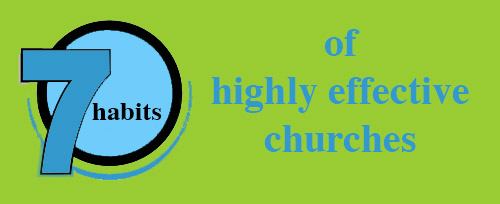Habit 3 – Help others
I was recently part of a discussion about the famous quote
The Church is the only society that exists for the benefit of those who are not its members.*
It appears in different forms, and is variously attributed to William Temple and G.K. Chesterton.
The point is clear. And it is found in Jesus’ understanding of his followers being salt, and light, and leaven. Salt enhances the good and limits the bad. Its purpose is not to turn everything into salt! The church may be a little flock but this little flock can hugely impact those it serves – just as salt, and light, and leaven affect.
Whom the church serves is, of course, unmeasurable, unquantifiable. Much easier to count bums on pews than quantify hands working out in the community. And it is, of course, inclusive – Christians working together in partnership with all people of good will.
Serving on a school board; volunteering; clearing a beach of pollutants; welcoming a household new to the neighbourhood; advocating for those unable to do so for themselves; sending goods and money to places of need… [add more examples in the comments…]
γὰρ ὁ υἱὸς τοῦ ἀνθρώπου οὐκ ἦλθεν διακονηθῆναι ἀλλὰ διακονῆσαι
the Son of Man came not to be served but to serve Mark 10:45
διακονέω diakoneo serve [often, menially]ἐὰν ἐμοί τις διακονῇ ἐμοὶ ἀκολουθείτω καὶ ὅπου εἰμὶ ἐγὼ ἐκεῖ καὶ ὁ διάκονος ὁ ἐμὸς ἔσται ἐάν τις ἐμοὶ διακονῇ τιμήσει αὐτὸν ὁ πατήρ
Whoever serves me must follow me, and where I am, there will my servant be also. Whoever serves me, the Father will honour. John 12:26
Some, of course, bait and switch. The purpose of helping others, for them, is really to subliminally lure more into the religious club. More in-drag, than out-reach. They regularly want to alter the quote to have the church existing for the benefit of those who are not yet its members. And stressing their added “yet” is not mine but theirs.
Sad as I am that worship is not explicitly seen as part of the mission of the church in the five-fold mission statement, it has, however, very much the approach of this post, with at least three of the five marks being outwardly looking:
- To respond to human need by loving service
- To seek to transform unjust structures of society, to challenge violence of every kind and to pursue peace and reconciliation
- To strive to safeguard the integrity of creation and sustain and renew the life of the earth
Often, this outwardly-focused, serving-others-beyond-church-walls approach is called “missional”. But I notice that this word too is regularly being captured by the bum-numbers-on-pews counters as the latest good way to increase worship attendance (and presumably money on the collection plate).
What can you add about this third habit: helping others? Can you give some more, concrete examples…
*****
*This quote may very well be a simplification of a text from Church and Nation by William Temple, “Only in His own gift of Himself is it reasonable to expect that all men will find what they need; only in a Church which is the vehicle of this gift, and is known to be this, and not a mutual benefit society organised by its own members for their several and collective advantage—only in a Church expressive of Divine transcendence can all nations find a home.”
The first habit is: Focus on God
The second habit is: Be Welcoming





I’m greatly enjoying this series, Bosco. Many thanks.
The “quote” has always irritated me, because the Church is of manifest, incalculable benefit to its members. I am grateful for your tracing the possible source of the quote to that passage of Temple, which clarifies that the Church is not “for itself” only in the sense that it is not a human creation but is rather called into being from outside itself as a “vehicle” of divine action.
I’ve been reading a lot of F. D. Maurice lately, and he is very strong on the idea that the Incarnation was/is unconditionally effective. The Christian should recognize all human beings as part of the one humanity that has in Christ been assumed into the being of God. The Church on that view is less about “in vs. out” than about bringing people to realize that they’re “already in”, and to commit their lives to that reality.
On the other hand, it is fairly clear from the New Testament that the Church *is* also partly about belonging and not belonging. Baptism severed, or radically relativized, family and civic relationships: “These are now my brothers and sisters, not you; Jesus is now my Lord, not Caesar.” And that came at a high price (as it still does today in places where conversion to Christianity is illegal or otherwise dangerous). But even then, it was less about choosing a new allegiance than about awakening to an existing reality that had merely not been perceived before. (Jesus was my Lord even before I gave him permission!)
For the record, while I abhor the “Mission Statement”, I am actually relieved that worship is not included in it. Early Christian worship wasn’t about “outreach”: it was closed to the uninitiated. In this more exhibitionist age, I suppose I am all for people being reached through beautiful, God-oriented worship. But I cannot agree with those (not you, Bosco!) who argue that in a “post-Christendom world” our worship ought to change — to be instrumentalized — to be more worldly (or “contemporvant”). Quite the opposite: relevancy is needed in the realm of catechesis and community fellowship. Worship’s “relevance” is disclosed only to existing faith, however inchoate it may be.
Thanks, Jesse.
Yes, there are many issues with the “quote”. It is manifestly false: often churches are the most inward-looking establishments, regularly concerned about the preservation of their pretty little building, and obsessing about dragging in people to finance that project. Also, there are other institutions (cf. “only”) that exist to serve those outside the organisation.
Could you point to some particular FD Maurice texts that simply propose the excellent point you make – especially if they are available online…
I don’t equate “mission” with “outreach” in the manner your last paragraph hints at. I also think the mission statement is being expanded now to becoming unmemorable. If, as your paragraph suggests, mission is too easily identified with outreach then, yes, adding worship would be going in exactly the wrong direction. God (and worship) is the goal – not the means.
Blessings.
Here are three passages from the book of Maurice’s I’m reading at the moment (his Sermons on the Prayer Book), with page references keyed to the copy you can find on Google Books (here: http://books.google.ca/books?id=zNcrAAAAYAAJ&dq=maurice+prayer+book&source=gbs_navlinks_s). Each has to do with the Communion Service:
PASSAGE 1 (Sermon XVI, p. 235)
But is it all a delusion? Are we investing bread and wine with some magical properties? Are we supposing that they admit us into a presence which but for them would be far off from us? Do they not rather bear witness by their simplicity, by their universality, that it is always near to us, near to everyone? Do they not say: Will you live, move, have your being in God, and yet be practically at a distance from Him because you will not let Him approach you, enter into converse with you, subdue you? Shall all this love be about us day by day, and shall we be living shut out from its power and influence, in a region of ice? Do you answer: But may not many have enjoyed this presence, may not many enjoy it now, who do not taste the elements? Believe, and give thanks that it is so. Acknowledge with hearty delight every fruit of God’s Spirit which you see in any person who rejects every Christian ordinance. Canvass it not, try not to make out that it is unreal, or less than it seems to be, lest you blaspheme the Holy Ghost. Prize this Sacrament as the witness, the deepest, truest, simplest witness that God is with men, that all good things are from Him, that nothing can be true in us but what is the reflection of His truth.
PASSAGE 2 (Sermon XVIII, pp. 264-5)
The Sacrifice is said to be not for the sins of a few picked persons — not for the sins of the Church — but for the sins of the whole world. Humanity is redeemed by Christ’s death. The Redemption is free and universal. What remains? To take the cup of thanksgiving, and call upon the name of the Lord. To enter into God’s presence believing that a living way is consecrated for us through the veil, that is, his flesh. […] Can you deliver men from actual superstitions and idolatries by introducing a true /notion/ about our Lord’s Atonement? If men are required to come with clear notions to God, oh, what a barrier do you interpose between Him and those whom He has reconciled to Himself! The Atonement is a fact, not a notion.
PASSAGE 3 (Sermon XIX, pp. 276-7)
Is there a man or woman of whom we dare not say, Christ died for thee? And if not, is there a man or woman to whom we may not proclaim, “The Spirit of Him who raised up Christ from the dead is seeking to raise thee out of this natural death, to quicken all the energies of thy soul, all the energies of thy body, to make thee a new creature with a soul like His soul, with a body like His glorious body.” To each man we say this, “Christ died for thee.” Each man has need to hear it for himself, to believe it for himself. But the language which speaks to him as an individual claims him as the member of a family. He is eating the one bread which is to sustain all as well as himself; he is drinking of the divine universal life; He has no property in Christ which all around him have not, which all who have the same flesh and blood, the same death, have not equally. The father who raised Him from teh dead has in Him quickened the whole race. Though we receive each for himself, the gift contains a promise and a prophecy for the whole Church and for mankind. Therefore so soon as we have received this bread and wine, we say, “Our Father.”
Thanks so much, Jesse. Blessings.
“Whom the church serves is, of course, unmeasurable, unquantifiable. Much easier to count bums on pews than quantify hands working out in the community. And it is, of course, inclusive – Christians working together in partnership with all people of good will.”
This is perhaps the seminal paragraph, Bosco, of your article. (I reckon the quote about the Church being the only organisation exiting …. for the sake of people who are not its members is actually by Archbishop Laud).
I think, Jesse, as a very new clergy-person, is too much preoccupied with the membership aspect – at the expense of Mission to ALL people created in the divine image and likeness of the Creator
Reverend Father, it would seem that you have mistaken me for one in Holy Orders. I must disabuse you of this error: no bishop has laid hands on me since my Confirmation. You must therefore dismiss my opinions solely as the Bigotry of All the Baptized. 🙂
(Though I confess I can’t see anything in what I wrote that would support your summary of my opinions.)
From the sideline, I got the impression you two were talking past each other… Blessings.
Sorry, Jesse. A case of mistaken identity, I see now. My apologies to you.